Intro
Blockchain has opened up new avenues for safe and decentralized transactions, paving the way for developments like decentralized finance and digital identity services. Despite these developments, however, a number of restrictions continue to prevent the wider adoption of blockchain and cryptocurrencies. Here are some key challenges:
- Throughput: As the adoption of blockchain and cryptocurrency grows, the networks become increasingly congested, resulting in slower transaction times and higher fees.
- Security: Security concessions are made to reduce fees and costs, leading to security breaches and hacking incidents, putting funds and the reputation of the technology at risk.
- Privacy: Transactions on public blockchain networks are visible to anyone, exposing sensitive financial information and creating privacy concerns for individuals and businesses.
The development of zero-knowledge technology has emerged as an answer to these problems. This idea first appeared in the late 1980s and has origins in both computer science and cryptography. Two people can independently confirm a statement’s veracity using zero-knowledge without disclosing any further information. In simpler terms, the prover can prove the truth of a statement to the verifier without revealing the underlying details through a simple proof. This technology has the potential to significantly improve the privacy, security, and scalability of blockchain and cryptocurrency transactions.

A zero-knowledge proof must adhere to three fundamental properties:
- Completeness: If a statement is verifiably true, an honest verifier, who follows the established protocol, will be convinced of its truthfulness by an honest prover.
- Soundness: If the statement being proven is false, it is impossible for a deceitful prover to convince an honest verifier of its truthfulness, except in cases of negligible probability.
- Zero-knowledge: If the statement is proven to be true, the verifier will not gain any additional knowledge beyond what the statement is proving.
Let’s dive deeper into this through a simple scenario.
Consider that you want to buy a property and you need to apply for a mortgage. You have to send over sensitive information that you need to check with a bank, but you want to keep it secret. Additionally, you don’t want the bank to have any access to the data after the verification is finished.
The bank will require various forms of documentation to assess the loan application, including:
- Personal identification, such as a driver’s license
- Income verification for financial stability
- Employer information
- Proof of residence
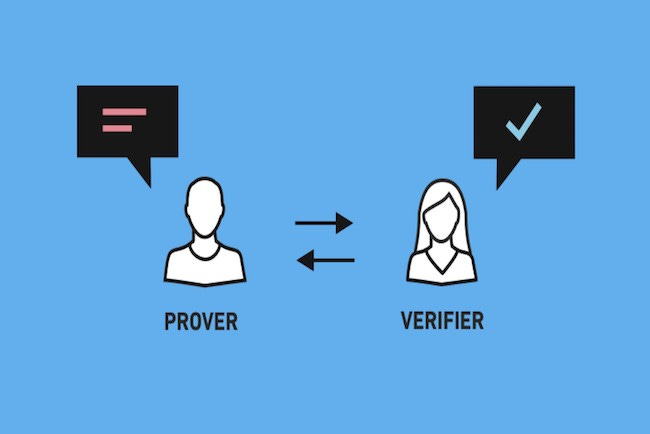
The loan provider can validate all of this information without ever seeing it thanks to zero-knowledge technology. The relevant documentation can be sent as cryptographic hashes, which the loan provider can then validate using a zero-knowledge proof scheme. With the help of this method, the loan provider can verify the accuracy of the data without endangering the applicant’s confidentiality and privacy. Additionally, the procedure can be repeated, allowing the information to be verified by numerous suppliers without jeopardizing its privacy.
Key Innovation of ZK in crypto
For crypto, zero knowledge is a game-changing technology that provides significant privacy and compression benefits. To ensure privacy, ZKPs use mathematical techniques that allow information to be verified without revealing the actual data. Furthermore, ZKPs provide the benefit of compression by storing a significant quantity of information in a compact proof. This reduction in the amount of data necessary for verification enhances efficiency, which is especially important in blockchain applications where storage and processing capacity are restricted. This proof can be used to validate batches of transactions or state transfers within a single update. The implementation of ZKPs in these applications helps to protect the security and privacy of sensitive information while also enhancing efficiency by reducing the amount of data required for verification.
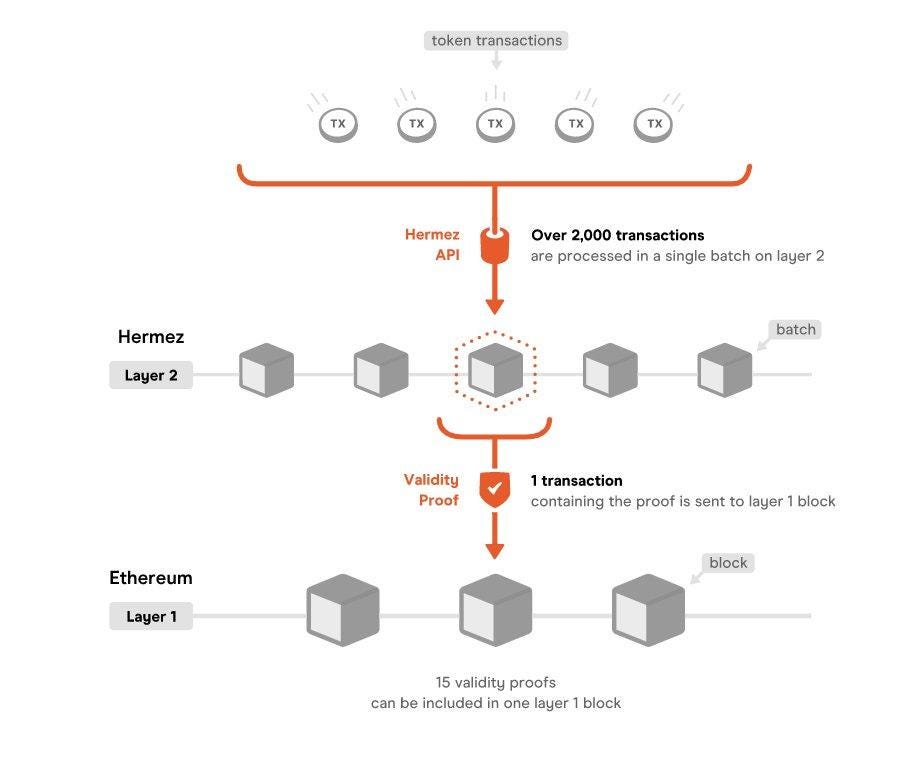
Industries ZK can unlock
The potential of Zk to solve several key challenges is crucial for the growth and widespread adoption of cryptocurrency. Let’s take a closer look at some issues and their impact on the growth of the industry.
Security in Interoperability: Interoperability is critical in the fast-paced world of DeFi for seamless transactions and effective trading. Current solutions, on the other hand, frequently suffer from significant latency, which can result in delayed and unreliable transactions. Because traders must be able to place orders quickly and efficiently, this can have a substantial impact on the user experience. Furthermore, current solutions may lack sufficient security protections, making them vulnerable to big cyberattacks and other sorts of exploitation. To address these issues, new solutions must provide low latency, high security, and decentralization, allowing traders to operate confidently within the DeFi ecosystem.
Scalability: Scalability is a fundamental issue that must be addressed if cryptocurrency is to attain its full potential. At the moment, the fastest blockchains can only handle a few hundred transactions per second. This is far from the scalability required to reach the global scale and attract hundreds of millions of people. Scalability is defined not only by the number of transactions per second but also by access patterns. If people want to use cryptocurrencies in the same way they use the internet, it needs to be far more scalable.
Privacy: Many people in the crypto industry are concerned about their privacy. Currently, everything done in decentralized finance (DeFi) is visible to everybody, which violates basic privacy norms. People desire to conduct their transactions in a secure and confidential manner, but DeFi’s existing transparency makes this challenging. The difficulty is to discover a technique to guarantee privacy while also preserving the audibility required for DeFi to function properly.
Current ZK-Based solutions
Here are some examples of how they can be used to address various issues:
zk-Bridges: zk-bridges are altering how we think about asset transfers between blockchains. These bridges employ zk-SNARKs technology to allow for the efficient transmission of data or assets between multiple blockchain networks without the necessity of a centralized committee. A prover is used in these systems to rapidly demonstrate to a blockchain that a given state transition occurred on another blockchain. The blockchain keeps a summary of the most recent block on the other blockchain, and fresh blocks can be synchronized by creating and sending a zk-SNARK that verifies the other blockchain’s tip has advanced from its previous state to its present state. Bridges built with ZK are also a step toward a future in which blockchains are more interoperable and can work together seamlessly.

ZK Rollups: ZK Rollups are a solution to two fundamental issues in the cryptocurrency world: privacy and scalability. The purpose of ZK Rollups is to create a setting in which smart contracts and transactions can be conducted off-chain while keeping the security assurances of on-chain transactions. This is accomplished through the use of zero-knowledge proofs, which allow computations to be verified without revealing any underlying facts. With ZK Rollups, all transactions are pooled off-chain before being validated by a single zero-knowledge proof and then committed to the main Ethereum network. This results in far reduced gas fees as compared to directly processing transactions on-chain, as well as significantly less burden on the Ethereum network. Furthermore, ZK Rollups solve privacy concerns by enabling the development of private contracts and transactions. Before being validated using the zero-knowledge proof, these private transactions are encrypted and aggregated with other transactions in the rollup. Because of this, ZK Rollups are suited for applications that require high levels of anonymity, such as decentralized finance (DeFi) platforms and gaming.
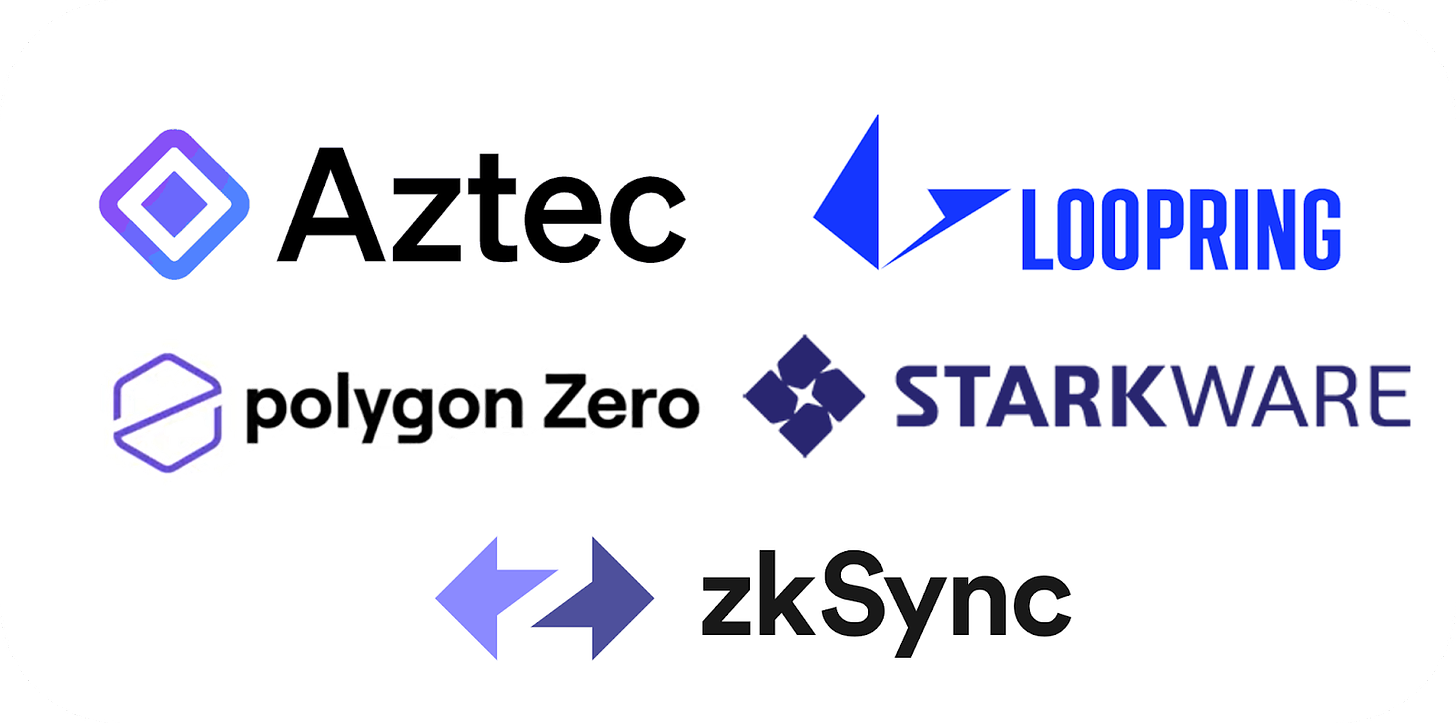
zk-EVM: The Zero-knowledge EVM (zkEVM) is a virtual machine that executes Ethereum smart contracts and uses zero-knowledge proofs to ensure its accuracy. It is a component of Ethereum’s zero-knowledge rollups scaling solution, which enhances network throughput by off-chaining computation and storage. The zkEVM generates proofs to assure that bytecode access, read-write operations, and calculations are executed correctly. It is made up of three parts: an execution engine, proof production, and proof verification. The zkEVM is significant because it may provide privacy and security for Ethereum smart contracts by checking execution correctness with zero-knowledge proofs and safeguarding confidential information. This enables the creation of safe, privacy-focused decentralized applications (dApps) in fields such as De-Fi, healthcare, supply chain, and others.
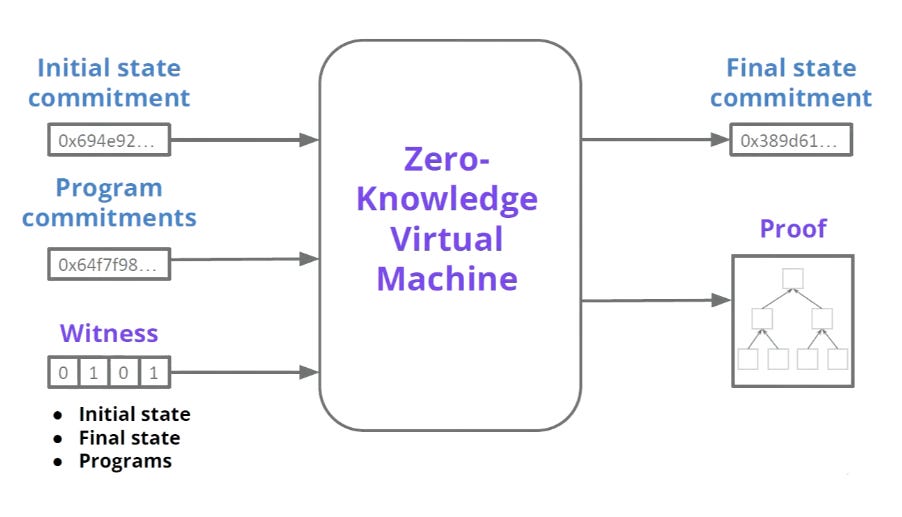
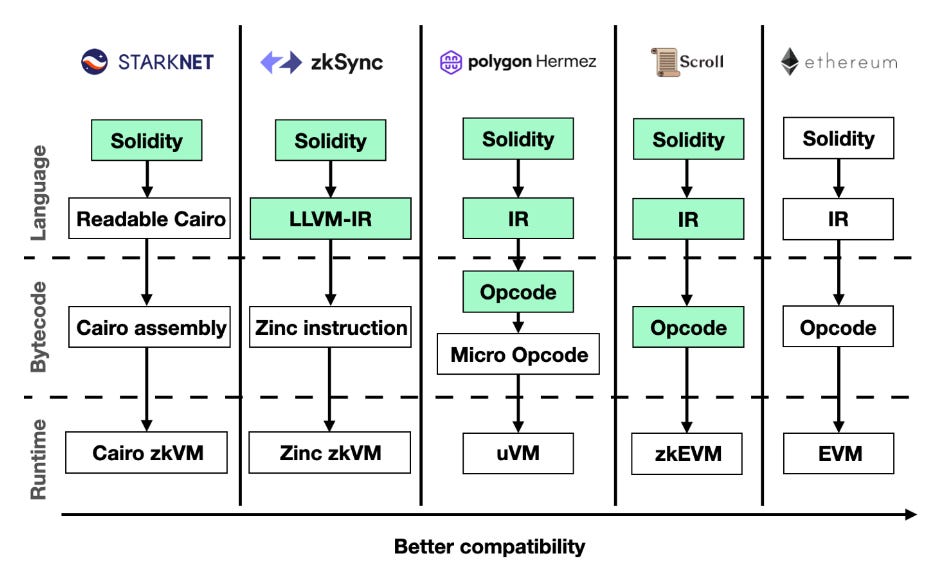
Identity Verification: Identity verification is a critical component of many online services and apps, but older techniques frequently require the disclosure of personal information. By employing ZK proofs to confirm one’s identity without giving any information, ZK technology provides a new and more secure approach to identity verification. This provides a more private alternative to established procedures and offers up new avenues for secure online transactions. Identity verification systems based on ZK are especially beneficial for organizations and consumers concerned about privacy and security, and they have the potential to revolutionize industries such as online banking, e-commerce, and others.
ZK DEXs: Zero-knowledge decentralized exchanges are a new and promising class of decentralized exchanges that use zero-knowledge proof technology to enable users to trade cryptocurrencies and other digital assets in a completely private and secure manner. Unlike traditional decentralized exchanges, which operate on a public ledger that anyone can access and monitor, zk DEXs allow users to transact anonymously without disclosing sensitive information about themselves or their trades. This privacy-preserving feature is achieved through zk algorithms that enable users to prove the validity of their trades without revealing any additional information and help mitigate concerns such as front running. In addition to privacy and security benefits, zk DEXs also offer the potential for improved scalability and throughput, as they allow for more efficient order matching and settlement. As such, zk DEXs are seen as a promising alternative to centralized exchanges, offering the best of both worlds – the security and privacy of decentralized trading and the efficiency and speed of centralized trading.
Exciting Infra/Enablers
Several creative projects have been developed to address various difficulties in numerous industries and fields, building on the current boom of zero-knowledge technology. These projects, which include novel Layer 2 solutions, private wallets, zk-based cross-chain asset transfers, privacy-focused transactions, and others, leverage zero-knowledge cryptography to enable secure and secret verification of sensitive information. Let’s take a look at some example projects:
Zcash: Zcash is a decentralized payments network focused on privacy that uses zero-knowledge proofs (ZKPs) to securely and anonymously send transactions across a public blockchain. This cryptographic mechanism enables two parties to verify information without disclosing the underlying data, allowing Zcash users to keep their financial privacy. The network provides two kinds of addresses: transparent (t-addresses) that can be monitored on the blockchain and shielded (z-addresses) that are entirely encrypted and untraceable. Users may ensure that their transactions are totally private by using z-addresses, making Zcash one of the most secure and confidential cryptocurrencies accessible. The network has evolved over time, with features like the Halo ZKP, the availability of a shielded-first Zcash wallet, and growing institutional support. The network’s creative usage of ZKPs has distinguished it as a leader in the privacy coin field, and it has a devoted following among users who cherish their financial privacy.
StarkWare: StarkWare, a Pantera portfolio company, was formed in 2018 with the goal of improving blockchain scalability and privacy. Its flagship products, StarkNet and StarkEx, are meant to address current blockchain system difficulties by harnessing the strength of zk-STARK proof technology. StarkNet is an Ethereum-based decentralized ZK-rollup that uses the ZK-STARK proof method to confirm transactions off-chain, decreasing the computational strain on the Ethereum network. StarkEx, on the other hand, is a centralized version of StarkNet created exclusively for DeFi trading applications. It has been a huge success, with $696 million in total value locked in, $635 billion in cumulative trade, and 60.5 million NFTs issued. Because of the Shared Prover technology, both StarkNet and StarkEx utilize zk-rollups and are driven by STARK proofs, allowing for the execution of low-cost transactions. Furthermore, StarkWare’s cryptography proof provides zero knowledge, transparency, simplicity, and post-quantum security, making it a formidable blockchain option. Eli Ben-Sasson, the originator of StarkWare, is a well-known computer science professor and co-inventor of STARK proofs. He has also made important contributions to Z Cash, increasing the StarkWare team’s expertise. The project has included Uniswap V3 into its platform, which is an important step toward achieving scalability on Ethereum and addressing some of the fundamental difficulties that existing blockchain systems face.
Braavos: Braavos, a Pantera portfolio company, is a complete crypto asset management solution based on StarkNet, a layer-2 ZK Rollup. It provides a wallet based on smart contracts with improved security and user experience features. The wallet is made up of two parts: the application and an on-chain account smart contract known as account abstraction. This enables arbitrary logic to be applied on a transaction before it is processed, adding security and improving user experience. Account abstraction enables capabilities such as multi-call, multi-factor authentication, account segmentation, paymaster, and more. The built-in Hardware Signer secures wallets and prevents theft by utilizing account abstraction and biometric authentication, rendering a specialized hardware wallet obsolete for all practical use cases. With these features and advanced security measures, Braavos intends to make cryptocurrency simple and worry-free for anyone seeking to gain control of their crypto independence.
Succinct Labs: Succinct Labs is developing a trustless interoperability solution that securely connects Ethereum and Gnosis Chain using on-chain light clients and zk-SNARK technology. The company is committed to a future of permissionless interoperability and has created a trust-minimized cross-chain bridge utilizing Proof of Consensus. The protocol verifies the source chain’s consensus in the target chain’s execution environment using on-chain light clients, which track block headers for each pair of communicating chains and rely on the economic security provided by the underlying L1 chain’s consensus for security without making any additional trust assumptions.
Brine: Brine, a Pantera portfolio company, is a one-of-a-kind DeFi platform that offers a full solution for cryptocurrency traders and investors. It combines the benefits of trading, DeFi, and spot trading in a risk-free, gas-free, quick, and low-fee environment. The technology removes the trade-off between trust, costs, speed, experience, and liquidity, resulting in a more seamless user experience. Brine benefits from the scalability, security, and reliability of this technology because it is built on Starkware’s powerful and secure infrastructure. With a capacity of 600,000 tps, the platform’s matching engine can handle high-volume periods and provide immediate order execution. This makes it an excellent venue for high-speed trading. It is an orderbook-based platform that provides a transparent and orderly market for buying and selling cryptocurrency assets. Brine provides a reasonable and accessible alternative for crypto traders and investors, with a transaction price of only 0.1% and no gas fees. Furthermore, the platform’s cross-chain capabilities enable traders to manage their funds from a single dashboard, making it easier to manage their portfolios and make informed trading decisions. Brine is positioned to be a notable competitor in the DeFi arena, because of the additional security and dependability of Starkware technology.
Axiom: New progress in the programmability of encryption has enabled trustless computation, but implementing it remains a barrier for smart contract developers. Axiom addresses this issue by providing smart contracts with access to all on-chain data as well as the capacity to do complex computations on it via a three-step process: reading, computing, and verifying. This produces ZK-verified outputs that may be used by any downstream smart contract, resulting in more expressive and trustworthy decentralized applications. It has numerous potential applications, including decentralized identity, trustless accounting, and safe voting. With smart contracts having access to all on-chain data and the ability to perform arbitrary computations, Axiom is revolutionizing the way blockchain scales and paving the way for a future of robust and trustworthy decentralized applications.
Mina: Mina Protocol, a Pantera portfolio company, is a blockchain network developed by O(1) Labs that emphasizes security, accessibility, and decentralization. Unlike other blockchains, Mina employs a “light” infrastructure that uses Proof-of-Stake (PoS) consensus and zk-SNARKs to reduce the computing power required for network consensus. zk-SNARKs are used as blockchain summaries, containing metadata-based proof of the blockchain’s validity, which enables smaller data sizes to be processed and promotes a more democratic and decentralized network. Mina Protocol’s small dataset size allows users to view and verify the entire blockchain and is also compatible with decentralized applications (dApps), allowing Snark-powered apps or “Snapps” to use data from various chains without disclosing user information. With its innovative technology, Mina Protocol is a significant contender in the decentralized finance (DeFi) space, as it securely brings real-world data to the blockchain and creates opportunities to revolutionize various industries.
Conclusion
The growth of zero-knowledge proof technology is causing substantial advancements in the blockchain business. The system addresses some of the most pressing issues confronting blockchains, including scalability, privacy, and security. The Ethereum network can handle more transactions thanks to applications of ZK, and user data is safeguarded by cryptographic assurances. The continuing improvements in this technology offer enormous promise for blockchain’s future and its ability to disrupt industries by providing secure and efficient solutions. It will be interesting to see how ZK technology affects and shapes the blockchain ecosystem as time goes on.



